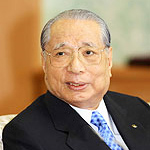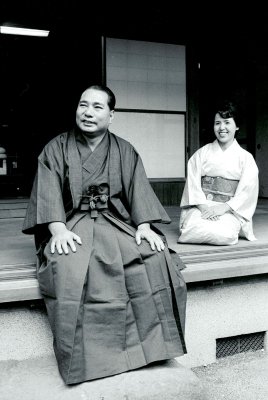 Daisaku Ikeda is the president of the Soka Gakkai International (SGI). He was born on January 2, 1928, in Tokyo. In 1947, at age 19, Ikeda decided to join the lay association called the Soka Gakkai. For more than ten years he worked with his spiritual mentor and second president of the Soka Gakkai, Josei Toda, in order to develop the Soka Gakkai and to establish a solid foundation for the organization. After Toda’s death, Ikeda became the third president of the Soka Gakkai. He is active in the areas of photography, literature, and poetry.
Daisaku Ikeda is the president of the Soka Gakkai International (SGI). He was born on January 2, 1928, in Tokyo. In 1947, at age 19, Ikeda decided to join the lay association called the Soka Gakkai. For more than ten years he worked with his spiritual mentor and second president of the Soka Gakkai, Josei Toda, in order to develop the Soka Gakkai and to establish a solid foundation for the organization. After Toda’s death, Ikeda became the third president of the Soka Gakkai. He is active in the areas of photography, literature, and poetry.
Youth
Daisaku Ikeda was the fifth son in a poor working-class family that lived on cultivating and harvesting seaweed. As a child, his health was very fragile. He fought for many years against the potentially fatal illness of tuberculosis.
When Japan entered World War II, Ikeda was a teenager. His experience of the destructive nature of war, and the loss of his elder brother at the front, led him to the profound decision to devote his life to world peace.
Membership in the Soka Gakkai
In 1947, at the age of 19, Ikeda attended a lecture by Josei Toda, president of the Soka Gakkai at the time. Profoundly affected by Toda’s personality, his clear philosophy, and his anti-militarist stance during the war, Ikeda decided to join the lay organization the Soka Gakkai (Organisation for Value Creation). Ikeda was determined to learn from Toda, and the latter had an enormous impact on his life.
Alongside Toda
Throughout his life Ikeda showed tremendous interest in literature, and from adolescence onward he began to write poems. When Ikeda could no longer continue his university studies due to financial constraints, Toda, who was not only a Buddhist philosopher but also a teacher and an editor, offered to give him private classes. For more than ten years, Ikeda worked side-by-side with his spiritual mentor to develop the Soka Gakkai and to give it a strong foundation. After Toda’s death, Ikeda became the third president of the Soka Gakkai. Since the early seventies, Ikeda has held dialogues with prominent people from around the world in the fields of politics, culture, education and science. More than fifty of these have been published as books, with people such as Mikhail Gorbachev, Elise Boulding, Joseph Rotblat and André Malraux.
Peace
Having committed his life to establishing world peace, Daisaku Ikeda, as president of the SGI, paved the way for the global spread of Nichiren Buddhism, convinced that this humanistic Buddhism will contribute to a greater awareness of the dignity of life. In 1983 he received the United Nations Peace Award, followed by many academic honors and honorary citizenships, the International Tolerance Prize of the Simon Wiesenthal Center, and the Rosa Parks Humanitarian Award.
Culture
Ikeda has founded a number of independent research institutes to promote the vision of fostering dialogue and solidarity for peace. These organizations include the Boston Research Center for the 21st Century (which in 2009 was given the name "Ikeda Center for Peace, Knowledge and Communication"), the Toda Institute for Global Peace and Policy Research, and the Institute of Oriental Philosophy. He has also established cultural institutions such as the Min -On Concert Association and the Tokyo Fuji Museum of Fine Arts. In 1991, the Victor Hugo House of Literature in Bièvres (France) was established in honor of the great French poet and writer.
Education
The Soka education system that Daisaku Ikeda has founded includes Soka primary and secondary schools; Soka University ( SUJ , Japan ); Soka Women's College; Soka University of America (SUA, California); and Soka kindergartens in Japan, Singapore, Malaysia and Hong Kong.
 Daisaku Ikeda is active in the areas of photography, literature, and poetry. He has two sons, Hiromasa and Takahiro, and lives with his wife Kaneko in Tokyo.
Daisaku Ikeda is active in the areas of photography, literature, and poetry. He has two sons, Hiromasa and Takahiro, and lives with his wife Kaneko in Tokyo.